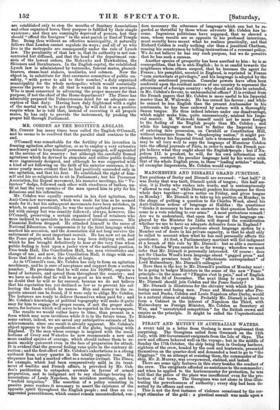MANCHESTER AND DISRAELI GRAND JUNCTION. THE positions of Derby and
Disraeli are reversed : "last half," it was Derby that was tacit, Disraeli quick of tongue; this half ses- sion, it is Derby who rushes into words, and is contemptuously " allowed to run on," while Disraeli ponders his eloquence for three whole days together—gives notice on Friday, and gives tongue on Monday ! Mr. Disraeli is to take up his position on Monday, in the shape of putting a question to Sir Charles Wood, about his Anti-Gallican ardour of language at Halifax : the questioner " thinks it necessary to have an answer to that question before we come to a vote relating to our arms." A most portentous remark ! Are we to understand, that upon the tone of the language em- ployed by the Minister for India will depend the consideration whether we are to have an adequate defensive force in England ? The rule with regard to questions about language spoken by a Member out of doors in his private capacity, is that he shall only be called to account when what he has said personally affects the questioner. At first, a Parliamentary martinet will feel indignant at a breach of this rule by Mr. Disraeli : but so able a successor to Mr. Charles Wynn cannot be so far wrong ; wherefore we must infer that Mr. Disraeli is personally interested. Of course : does not Sir Charles Wood's keen language about "gagged press" and Napoleonic promises touch the "affectionate correspondent" of Lord Malmesbury, Mr. Disraeli's colleague ?
Here then is the key to Mr. Disraeli's position of Monday next : he is going to badger Ministers in the sense of the new " Peace " principle—in the sense of " l'Empire c'est la pair," and of English trust in the 2d of December. The next thing to expect is that Mr. Disraeli should join Cobden and the Peace Society? Mr. Disraeli is illustrious for the chivalry with which he joins losing causes and losing men. Peace and Manchester after Pro- tection and Bucks, Cobden and Louis Napoleon after Derby, would be a natural climax of sinking. Probably Mr. Disraeli is about to form a Cabinet in the interest of Napoleon the Third, with Malmesbury as Foreign Minister, Mr. Cobden as Secretary at War, and " unrestricted competition" for the British crown and empire as the principle. It might be called the Unprotectionist Ministry.


























 Previous page
Previous page